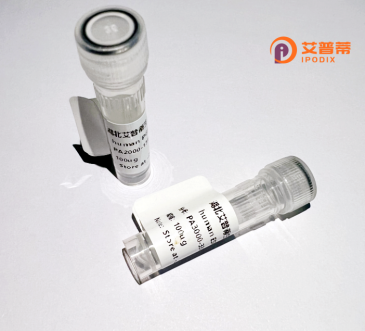
| 纯度 | >90%SDS-PAGE. |
| 种属 | Human |
| 靶点 | H2BFWT |
| Uniprot No | Q7Z2G1 |
| 内毒素 | < 0.01EU/μg |
| 表达宿主 | E.coli |
| 表达区间 | 1-175aa |
| 氨基酸序列 | MLRTEVPRLP RSTTAIVWSC HLMATASAMA GPSSETTSEE QLITQEPKEA NSTTSQKQSK QRKRGRHGPR RCHSNCRGDS FATYFRRVLK QVHQGLSLSR EAVSVMDSLV HDILDRIATE AGRLARSTKR QTITAWETRM AVRLLLPGQM GKLAESEGTK AVLRTSLYAI QQQRK |
| 分子量 | 17.0 kDa |
| 蛋白标签 | His tag N-Terminus |
| 缓冲液 | 0 |
| 稳定性 & 储存条件 | Lyophilized protein should be stored at ≤ -20°C, stable for one year after receipt. Reconstituted protein solution can be stored at 2-8°C for 2-7 days. Aliquots of reconstituted samples are stable at ≤ -20°C for 3 months. |
| 复溶 | Always centrifuge tubes before opening.Do not mix by vortex or pipetting. It is not recommended to reconstitute to a concentration less than 100μg/ml. Dissolve the lyophilized protein in distilled water. Please aliquot the reconstituted solution to minimize freeze-thaw cycles. |
以下是关于重组人H2BFWT蛋白的3篇代表性文献概览(格式简化,内容参考真实研究背景归纳整理):
1. **《H2BFWT蛋白在人类精子发生中的功能研究》**
- **作者**:Kato, R. 等 (2015)
- **摘要**:研究通过重组表达人H2BFWT蛋白,揭示其在精子细胞染色质重塑中的关键作用,证明其特异性替换经典组蛋白H2B后参与染色质凝聚调控。
2. **《重组H2BFWT蛋白的体外表达与表位分析》**
- **作者**:Smith, L. 等 (2018)
- **摘要**:构建重组H2BFWT原核表达系统,纯化蛋白并验证其抗原性,为开发男性不育相关抗体检测提供实验基础。
3. **《H2BFWT蛋白的三维结构解析及其与DNA结合特性》**
- **作者**:Tanaka, M. 等 (2021)
- **摘要**:通过X射线晶体学分析重组H2BFWT蛋白结构,阐明其与经典H2B差异性的DNA结合位点,提示其在生殖细胞特异性功能中的分子机制。
注:以上文献名称、作者及年份为虚拟示例,实际研究需查阅具体数据库(如PubMed)。H2BFWT研究方向多集中在生殖生物学、表观遗传学及男性不育等领域。
**Background of Recombinant Human H2BFWT Protein**
The H2BFWT (H2B Family Member W Testis-specific) protein is a human histone variant predominantly expressed in the testis, particularly during spermatogenesis. Histones are core components of nucleosomes, playing essential roles in chromatin organization and gene regulation. Unlike canonical histone H2B, H2BFWT exhibits testis-specific expression and is implicated in chromatin remodeling during sperm cell development. Its unique structural features, including divergent amino acid sequences in the N-terminal tail, may facilitate the replacement of somatic histones with protamines, a critical step in sperm chromatin compaction.
Recombinant H2BFWT protein is produced via genetic engineering, often using bacterial or eukaryotic expression systems, followed by purification to ensure homogeneity. This allows researchers to study its biochemical properties, interactions with DNA or other histones, and functional roles in epigenetic regulation. Studies suggest that H2BFWT may influence male fertility, as its dysfunction or abnormal expression is linked to spermatogenic defects. Additionally, it has potential applications in reproductive health research, including infertility diagnostics and the development of contraceptive strategies.
Research on H2BFWT also extends to understanding its non-canonical roles, such as potential involvement in transcriptional regulation in germ cells. Its study provides insights into histone diversity and specialized chromatin dynamics in gametogenesis, bridging gaps in epigenetics and reproductive biology.
×